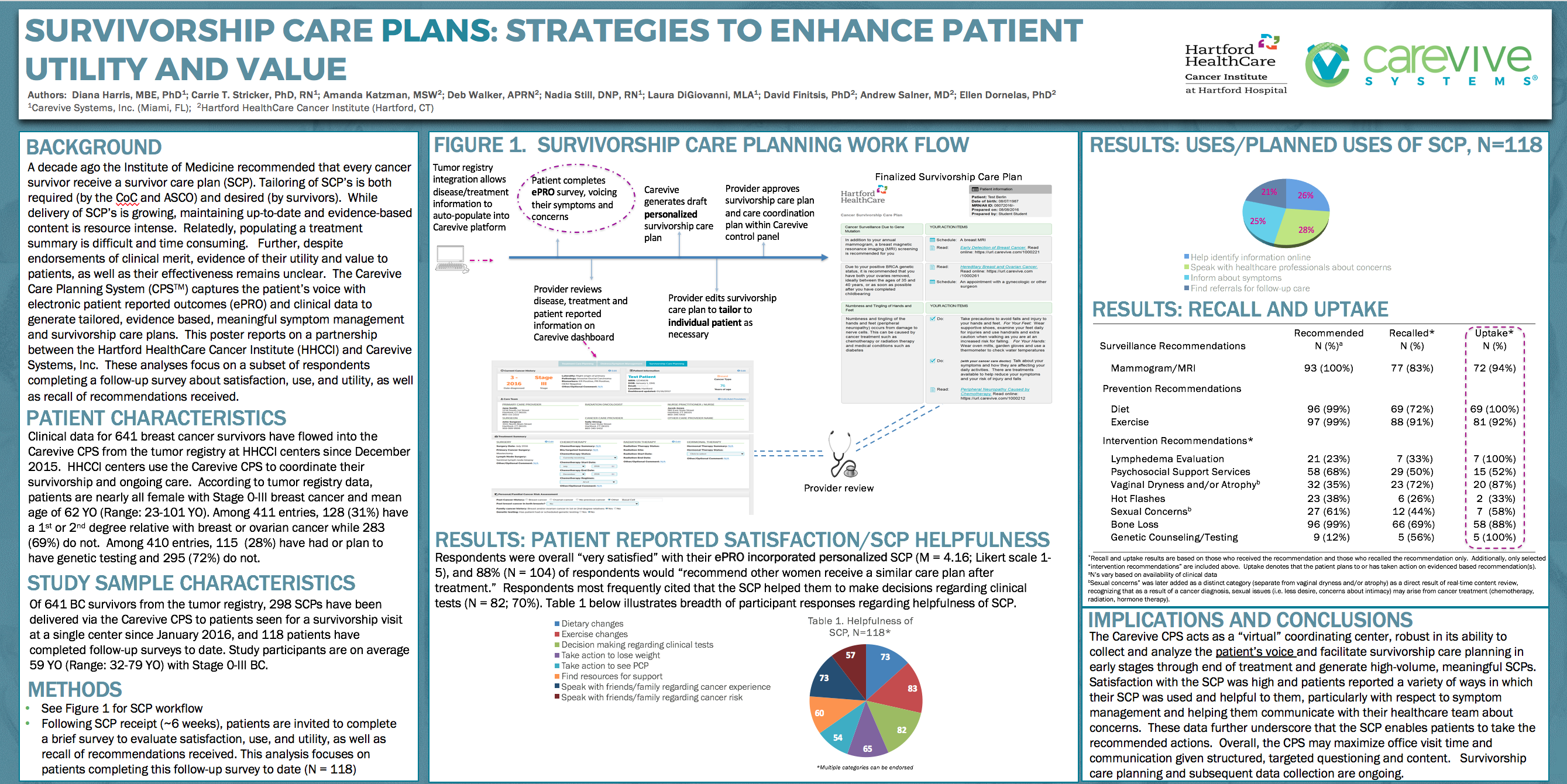
Survivorship Care Plans: Strategies to Enhance Patient Utility and Value
Authors: Diana Harris, MBE, PhD1; Carrie T. Stricker, PhD, RN1; Amanda Katzman, MSW2; Deb Walker, APRN2; Nadia Still, DNP, RN1; Laura DiGiovanni, MLA1; David Finitsis, PhD2; Andrew Salner, MD2; Ellen Dornelas, PhD2
1Carevive Systems, Inc. (Miami, FL); 2Hartford HealthCare Cancer Institute (Hartford, CT)
Poster presented at ASCO’s Cancer Survivorship Symposium 2017
Background
A decade ago the Institute of Medicine recommended that every cancer survivor receive a survivor care plan (SCP). Tailoring of SCP’s is both required (by the CoC and ASCO) and desired (by survivors). While delivery of SCP’s is growing, maintaining up-to-date and evidence-based content is resource intense. Relatedly, populating a treatment summary is difficult and time consuming. Further, despite endorsements of clinical merit, evidence of their utility and value to patients, as well as their effectiveness remains unclear. The Carevive Care Planning System (CPSTM) captures electronic patient reported outcomes (ePRO) and clinical data to generate tailored, evidence based symptom management and survivorship care plans. This poster reports on a partnership between the Hartford HealthCare Cancer Institute (HHCCI) and Carevive Systems, Inc. These analyses focus on a subset of respondents completing a follow-up survey about satisfaction, use, and utility, as well as recall of recommendations received.
Patient Characteristics
Clinical data for 641 breast cancer survivors have flowed into the Carevive CPS from the tumor registry at HHCCI centers since December 2015. HHCCI centers use the Carevive CPS to coordinate their survivorship and ongoing care. According to tumor registry data, patients are nearly all female with Stage 0-III breast cancer and mean age of 62 YO (Range: 23-101 YO). Among 411 entries, 128 (31%) have a 1st or 2nd degree relative with breast or ovarian cancer while 283 (69%) do not. Among 410 entries, 115 (28%) have had or plan to have genetic testing and 295 (72%) do not.
Study Sample Characteristics
Of 641 BC survivors from the tumor registry, 298 SCPs have been delivered via the Carevive CPS to patients seen for a survivorship visit at a single center since January 2016, and 118 patients have completed follow-up surveys to date. Study participants are on average 59 YO (Range: 32-79 YO) with Stage 0-III BC.
Methods
- See Figure 1 for SCP workflow
- Following SCP receipt (~6 weeks), patients are invited to complete a brief survey to evaluate satisfaction, use, and utility, as well as recall of recommendations received. This analysis focuses on patients completing this follow-up survey to date (N = 118)
Results: Patient-reported Satisfaction/SCP Helpfulness
Respondents were overall “very satisfied” with their SCP (M = 4.16; Likert scale 1-5), and 88% (N = 104) of respondents would “recommend other women receive a similar care plan after treatment.” Respondents most frequently cited that the SCP helped them to make decisions regarding clinical tests (N = 82; 70%). Table 1 below illustrates breadth of participant responses regarding helpfulness of SCP.
Results: Uses/Planned Uses of SCP, N=118
Results: Recall and Uptake
Implications and Conclusions
The Carevive CPS acts as a “virtual” coordinating center, robust in its ability to facilitate survivorship care planning in early stages through end of treatment and generate high-volume, meaningful SCPs. Satisfaction with the SCP was high and patients reported a variety of ways in which their SCP was used and helpful to them, particularly with respect to symptom management and helping them communicate with their healthcare team about concerns. These data further underscore that the SCP enables patients to take the recommended actions. Overall, the CPS may maximize office visit time and communication given structured, targeted questioning and content. Survivorship care planning and subsequent data collection are ongoing.








